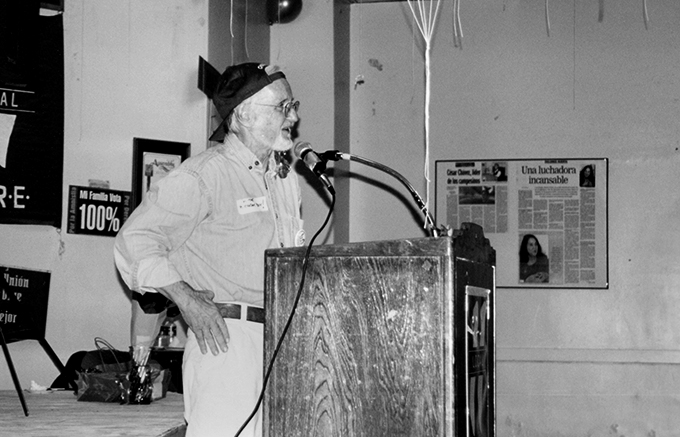Exit, Laughing
By Gerry Daley

Irascible. Relentless. Impatient. Hilarious. Generous. Going through my inventory of adjectives applicable to Paul B. Worthman (“PBW” was the invariable email signature during our times of working for the same union), these are the ones that floated immediately to the top. But the theme that runs through all of the memories is teaching. PBW, a natural-born educator, was always and everywhere teaching all of us how to:
- Be good union members
- Be in solidarity with all workers locally, nationally, internationally
- Fight the power of unaccountable, illegitimate bosses (i.e., ALL bosses)
- Fight racists and sexists
- Fight fascists wherever we found them (see “unaccountable, illegitimate bosses” supra)
- Be leaders in a Wobbly sense
- Re-introduce the “C” word (class) to American workers, even those in show business
- Have a lot of laughs
- Teach our fellow-workers how to do all of the above
By now I can’t remember how I first met PBW – who it was that introduced us, or on what campaign we first intersected. It might have been through Lou Siegel; it might have been the mid-‘90s iteration of J For J. In any event, when I was part of a small reform movement within AFTRA’s Los Angeles Local in the mid-‘90s, I helped PBW get hired on as an organizing staffer working with both the Local and National Union. We had a lot of fun (and some modest albeit temporary victories) trying to bring AFTRA back to its radical roots.[1] When I left AFTRA for the Writers Guild, PBW took over my job as director of the AFTRA L.A. Local’s broadcast department and continued to torment the networks (and some of the reactionaries in the AFTRA command structure). When I left the Writers Guild several years later, I landed in one of PBW’s old jobs: as representation specialist at the California Faculty Association. It was fascinating to go through their archives (the Union was founded in the early 1980s, and PBW was present at the creation) and see how much of the structure of faculty rights in the Cal State University system was created by PBW and Ed Purcell. Even today, forty years later, CSU faculty still live in a house those two built.
Maybe the most fun we ever had on a project was team-teaching a class at L.A. Trade Tech in 2004 on “U.S. Working Class & Cinema,” combining most of our mutual obsessions (baseball is another one, so we managed to work in “Bingo Long And His Travelling All-Stars and Motor Kings”). Our students were a group of 25 or so workers, members of various L.A. unions from all kinds of trades, who watched some great movies, read some great articles and book chapters (gathering the readings might have been the most fun for both of us), and interacted with a stellar line-up of show-biz guest speakers. We kept looking for a chance to do that class again, but our insane workloads never aligned.
When I left CFA – I seem to use the expression “When I left [Union X]” a lot[2] – wonder what that’s about? – and went to work for the California Nurses Association, I continued to study under the master. He was always available for a consult and ready to offer creative solutions to organizing, grievance or bargaining problems, even after he retired and he and Linda absconded to their beautiful craftsman bungalow in Berkeley. Seems appropriate for a craftsman of contract language and campaign strategies.
In these dark months of the phony war period leading to the coming Anschluss of January 20, it is the laughing that I will especially remember. PBW never stopped laughing at the idiocy and pretentions of the bosses, oligarchs and fascists, and neither should we.
Syllabus “U.S. Working Class & Cinema
[1] AFTRA, the American Federation of Television and Radio Artists, was founded as AFRA (pre-TV) in the mid-1930s by a cadre of left performers in the radio production hubs of New York and Hollywood. It was, until its back was broken by the blacklist in the mid-1950s, the most progressive and most effective Union in show business. For example, AFTRA negotiated the first industry-funded pension in entertainment, and a 100% residual for ANY re-use of TV programs. If you want to know why so much great LIVE TV was made during the medium’s so-called golden age of the ‘50s, it was because AFTRA made it just as expensive to re-run a Playhouse 90 episode as to produce a new show, thus generating a ton of work for actors. That lasted only a short while, until SAG (under the “leadership” of its then-president– wait for it – Ronald Reagan), as part of its 50-year raid on AFTRA’s jurisdiction in TV, undercut the 100% residual with a descending scale of payments for each subsequent re-use. Thus was born the age of re-runs (and the phenomenon of TV actors receiving residuals checks of ONE CENT, see image below). For anyone interested in AFRA’s great years and the damage done by the blacklist, see Harvey, Rita Morley, Those Wonderful, Terrible Years: George Heller and the American Federation of Television and Radio Artists, Southern Illinois University Press (1996).
[2] I don’t think I got to use this expression quite as often as PBW did. Union work is notoriously precarious for shit-stirrers, and PBW’s list of one-time employers is truly impressive. But he left the kind of trail that all of us strive for: universally beloved by his members, universally hated by the employers, universally feared by timid union bureaucrats. The Wobbly Trifecta!
